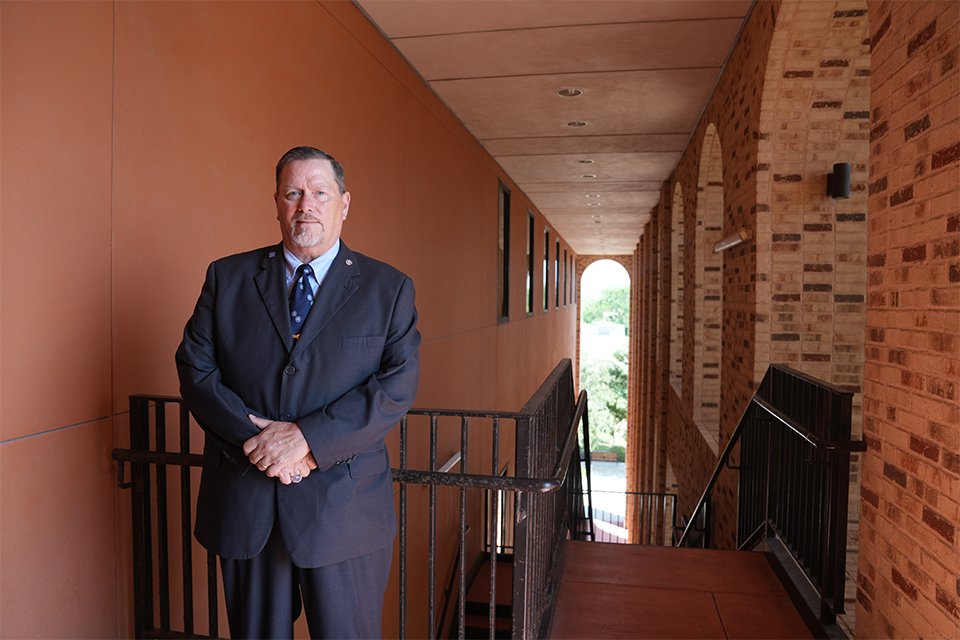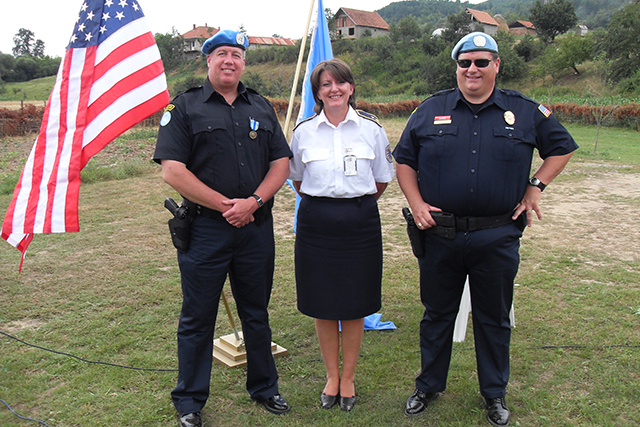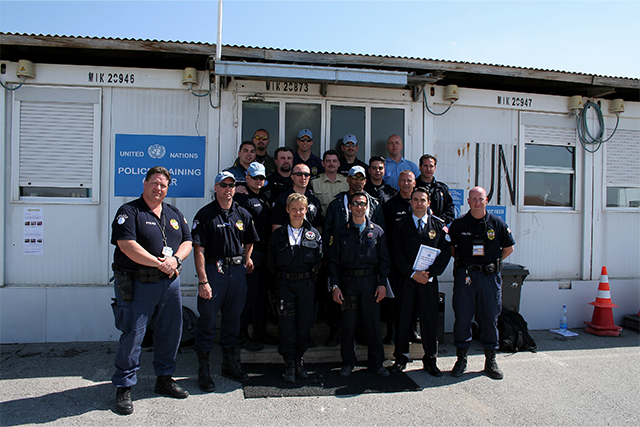
Dr. Micheal Sanchez, lecturer III of Criminal Justice at UTRGV, serves with the United Nations Police and brings his knowledge and expertise to his Criminal Justice classes at UTRGV. (UTRGV photo by Victoria Brito Morales)
News Release | Success

Dr. Micheal Sanchez, lecturer III of Criminal Justice at UTRGV, serves with the United Nations Police and brings his knowledge and expertise to his Criminal Justice classes at UTRGV. (UTRGV photo by Victoria Brito Morales)
Friday, October 24, 2025
Faculty Focus, Recognitions
By Victoria Brito Morales
BROWNSVILLE, TEXAS – OCT. 24, 2025 – Today, on the 80th anniversary of the United Nations, one UTRGV faculty member is reflecting on his experience in law enforcement and the perspective his early career has afforded him.
Dr. Michael R. Sanchez, lecturer III in the Department of Criminal Justice, spent four years as a UN police officer (UNPOL), serving in Kosovo and Haiti during pivotal times in the history of those countries.
His experiences with UNPOL, Sanchez said, have provided him with a global perspective not only on police work, but also on the world in general. It is that perspective he passes along to his students in the UTRGV College of Liberal Arts.
UNPOL was a major turning point in many ways, he said – one that led him from police work to a gratifying career in education. Originally from East Hampton, New York, Sanchez had been preparing to work in law enforcement since he was 15, when he joined the Civil Air Patrol, an auxiliary of the U.S. Air Force. He went on to serve two years in the U.S. Army, followed by a stint at the Suffolk County Sheriff’s Department in Virginia.
Then, he moved his family to Texas, his father’s home state, where he worked with the Port Isabel and Indian Lake police departments. Soon after, the opportunity of a lifetime came along.
“It was Newtonian,” he said. “For every action, there is an equal and opposite reaction.”
While working in Port Isabel in 2000, he met a reserve police officer named Richard Moore, who had been overseas working on the UN Police mission in Bosnia. Moore needed assistance renewing his Texas police license. Sanchez took some time after his shift to help Moore with the necessary paperwork, a helpful deed that one day would pay off tenfold.
A few years later, in 2005, he was at the Department of Motor Vehicles with one of his four sons – preparing for his son’s departure to the U.S. Army – when Sanchez ran into Moore again. During their catch-up chat, Moore suggested Sanchez apply for UNPOL.
Sanchez had already applied, though, and was discouraged because there were thousands of applicants vying for a UNPOL spot. It just took a few minutes for his life to change. Moore was on the phone with someone who could expedite Sanchez’s application. Then, he was accepted.

KOSOVO AND GATE 31
After rigorous UNPOL training in Washington D.C., Sanchez was off to his first post in December 2005. It was Kosovo, then a part of Serbia until 2008, when the country declared independence from the Serbian government.
In 1998 and 1999, long before Sanchez’s arrival to the region, Serbian forces had launched a violent crackdown in the region that resulted in a NATO air campaign, led by the United States, to force Serbian troops to withdraw.
After the Serbian Army finally did withdraw from Kosovo, in 1999, the region was left without a functioning government or any public services. The United Nations stepped in to serve as the de facto government of Kosovo through the United Nations Mission in Kosovo (UNMIK), which administered the territory for more than eight years while preparing for its eventual independence. UNPOL was one element of UNMIK with the initial job of policing Kosovo, in the absence of any other police force. The UNMIK Police then had the mandate to recruit, vet, train and mentor an organic police force from scratch, which ultimately became the Kosovo Police.
During that preparation time, UNPOL assisted the local police in Kosovo, including the hotbed municipality of Mitrovica, in the northern region. Serbia opposed the international presence in Kosovo and wanted to retain Kosovo as a province.
The assignment presented an opportunity for Sanchez to display his leadership skills, as he was working on the administrative end of UNPOL supervising seven different units. During his four years with the UN, Sanchez worked in conflict zones and witnessed moments of chaos and courage. One of those moments came in 2008, when riots erupted in Mitrovica, leaving dozens of UN officers injured and one dead.
Each UNPOL unit maintained a reserve force to be available if additional manpower was needed in the field. Sanchez maintained the reserve roster for the administrative directorate. During the 2008 riots, he was ordered to send his 24-man reserve force to guard a critical border gate, Gate 31, that had been attacked by an armed mob and burned to the ground only one month prior. To complicate matters, Gate 31 was on the far side of the Mitrovica region, which was currently in chaos.
“When the deputy commissioner ordered me to send personnel armed only with pistols to guard a critical border gate on the north side of Kosovo – Gate 31 – I refused to let them go alone,” Sanchez said. “I was ordered to stay at headquarters as a command level officer, but I broke protocol and went with them in defiance of order. It was dangerous, but I couldn’t let people I was responsible for go without someone willing to make decisions on the ground.”
Eventually, a platoon of Pakistani soldiers arrived as relief for the mission. Sanchez fully expected to be sent home for insubordination. Instead, his superior thanked him for his moral courage.
“That was the greatest compliment I’ve ever received,” Sanchez said. “Moral courage is doing the right thing even when it could cost you. That experience taught me what real leadership looks like.”
It was one of the most defining times of his life, he said, to serve in Kosovo when the nation was establishing its independence.
“I wasn’t a tourist who happened to be there,” Sanchez said. “I was in an executive-level position with the United Nations Police, helping to bring about the creation of a nation.”

HAITI AND THE EARTHQUAKE
Sanchez was serving in Haiti in 2010 during and after the January 12, 2010, earthquake that devastated the Caribbean nation.
“I was in bed reading when I felt a crash,” he said. “When I was in the Army, I was in artillery, and you can feel the concussion of an explosion before you hear the boom. That’s what it felt like. Then the building started shaking.”
The vibrations were disorienting, he said, and he could still call up in his mind’s eye the disturbing images long after the quake.
“So much of your equilibrium is tactile and visual,” he said. “I was in the parking lot with my wife, off the beach, and the sand was moving like the ocean. Our feet and ears were getting different signals. It disoriented us for a good eight hours and I still have little tendrils of PTSD from that. I’m super sensitive to low-frequency vibrations.”
At the time, Sanchez had been disappointed not to have a higher administrative position like the one he held in Kosovo.
“When the chief of administration position in Haiti was posted, twice, many asked me to apply,” he said. “But I had given my regional commander my word that I would stay in my post and give it my all, so I refused to apply.”
The individual who held that position died in the earthquake, which claimed nearly 300,000 lives.
“Integrity saved my life,” Sanchez said.
THE NEXT STEP: EDUCATION
His life was dangerous, at times, policing war-torn countries around the world. But through it all, finishing his education was never far from his mind.
In 2008, when he was 45 years old and while working as the director of personnel and administration for the UN Police in Kosovo, he revived his educational journey. He started with just half the credits needed to get a bachelor’s degree in Police Science online with Ottawa University in Ottawa, Kansas, which he completed online in 2008, while still working as a UNPOL officer in Kosovo. He followed that up with an online master’s degree in Criminal Justice Administration from Utica College (now Utica University), while serving as a UNPOL in Haiti, which he completed in 2011, and a Ph.D. in Business Administration with a specialization in Criminal Justice from Northcentral University in Prescott Valley, Arizona, (now National University) in 2016.
“I tell my students, you're doing it right, I did it backwards! I had the career, then I got the education,” Sanchez said. “It made my education a little easier, though, because everything they were talking about, like in my master's program, I had been doing for 20 years. I had a lot more real-world context.”
For Sanchez, teaching and mentorship are about more than academics. They’re about having purpose and integrity.
“If I take all of this experience to the grave, then it’s wasted,” Sanchez said. “I want it to mean something. That’s where integrity comes back in, doing something that matters.”
Over the years, he said, he has built connections around the globe. Among his colleagues are high-ranking officials and international leaders, including Atifete Jahjaga, a former Kosovo Police counterpart who served as president of Kosovo from 2011 to 2016; and Imran Shaukat, a UN associate who is currently the second-highest ranking officer in Pakistan’s police service and is one of the premier terrorist hunters in the world, ADIG or Additional Deputy Inspector General of Police. Both have contributed to his classes by video lectures with students at UTRGV.
Sanchez brings those global experiences into his leadership classes, using real-world stories to inspire students to lead with courage and integrity. He said one of his proudest moments was when one former ROTC student asked him to wear his UNPOL uniform and administer their first salute at their commissioning ceremonies, a military tradition that marks the start of an officer’s service.
“I saw one of them last week, he graduated in 2019 and still stays in touch,” Sanchez said. “That means this is making a difference.”
Today, Sanchez is the author of Four Years with the United Nations International Police, which shares in-depth details of his life and many lessons learned during his time with UNPOL.
“I lived a multicultural experience you can’t imagine,” Sanchez said. “I learned lifetimes of information and experience. I worked with people from 72 different countries. I shared an office with an Egyptian named Ahmed Moslemany, and we would have hours-long conversations about life, culture and religion. I learned so much about the world.”
In addition, Sanchez is still a sworn peace officer. He is a reserve lieutenant with the Cameron County Precinct 2 Constable’s Office.
ABOUT UTRGV
Celebrating its 10th anniversary during the 2025-2026 academic year, The University of Texas Rio Grande Valley (UTRGV) is on a mission to transform the Rio Grande Valley, the Americas and the world. One of the country’s largest Hispanic-Serving Institutions and Seal of Excelencia certified, UTRGV has earned national recognition for its academic excellence, social mobility and student success since opening in Fall 2015. Ranked among the Best Colleges for your Tuition (and Tax) Dollars in 2025 by Washington Monthly (#7 nationally; #1 in Texas), UTRGV continues to break enrollment records, launch new academic and athletics programs and progress toward achieving R1 research status.
The only university in Texas with schools of Medicine and Podiatric Medicine, UTRGV’s regional footprint spans South Texas – with locations, teaching sites, and centers established in Edinburg, Brownsville, Rio Grande City, McAllen, Weslaco, Harlingen, Laredo, Port Isabel and South Padre Island.